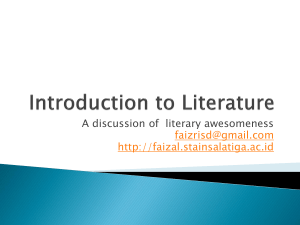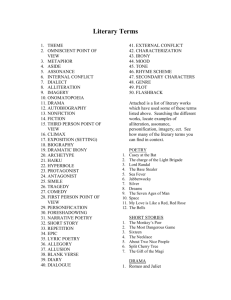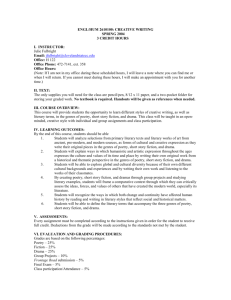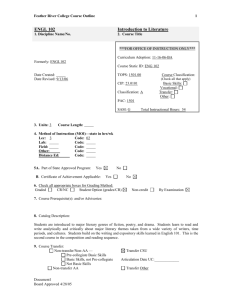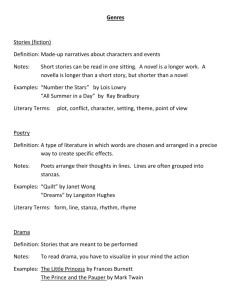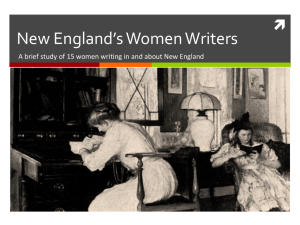Introduction to Literature
advertisement
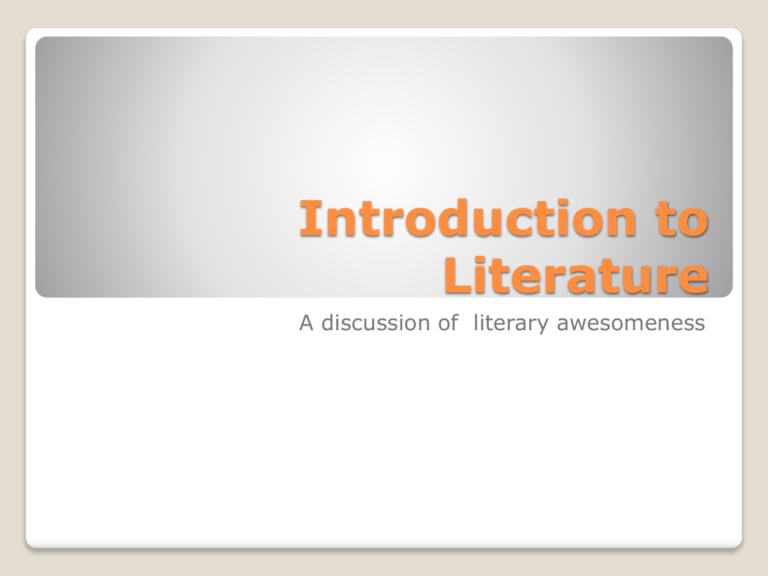
Introduction to Literature A discussion of literary awesomeness LITERATURE LEARNING What’s literature? The writing or the study of books, etc valued as works of art (drama, fiction, essays, poetry, biography, contrasted with technical books and journalism)(Hornby dictionary). What’s learning? The acquisition and development of memories and behaviors, including skills, knowledge, understanding, values, and wisdom. The aims of literature learning To widen our knowledge and visions to understand more about some great literary works, famous authors, and their thought. It will also make us get acquainted with their ideas, their feelings, and their attitudes towards life, man, nature and God. The aims of literature learning It is a means of transformation, that is, indirectly it may lead the wrong back to the right path although not all literary works are preaching and moralizing. Instances: Hemingway’s The old man and the sea, Dickens’s Oliver twist , Shakespeare’s Hamlet, George Eliot’s Silas Marner , Jonathan Swift’s Gullivers’s Travel, Stevenson’s Treasure Island and Oscar wilde’s Happy prince. . Another Distinction of literary genres: Popular Fiction vs. “Serious” Literary works Pop fiction like Harry Potter movies and pop song lyrics are considered less valuable than “serious” literary works like Shakespearian drama, Dickens's novel or Wordsworth’s poem Recently in Indonesian people talk about: Secular literature vs Islamic/dakwah literature. The secular one refers to Shaman’s Ayu Utami and a writer like Dinar rahayu whereas the Islamic one refers to HTR, Asma Nadia, Gola Gong etc. The aims of literature learning Literature helps us to be (become more) realistic, mature, wise and humane. It helps understand human values, sentiments, interests and problems. It brings us closer to other human beings of the same or different nationalities, cultures, human values etc. we become more tolerant, balanced and fuller. What’s English literature? Narrow sense: anything that is written: time tables, play’s dialogues, textbooks, travel brochures and so on. Broad sense: The writing or the study of English books, etc valued as works of art (drama, fiction, essays, poetry, biography, contrasted with technical books and journalism).it commonly refers to British and American literature. Short story Literary genres prose Novella novel Comedy Literature Drama tragedy Epics poetry Ballads Lyrical poetry The nature of good literature Good literature must seem lifelike and meaningful. it is caused by its focus on the central themes of all literature: life, truth, justice and love. . The nature of good literature The originality of the works of art. Instances: Hamlet and Machbeth were real historical characters but then Shakespeare by his craftsmanship and style made out of these old figures and stories in a new and fascinating light. The nature of good literature It should be life-enhancing. Matthew Arnold said about poetry as a criticism of life. Andre harjana says,”literature deals with the the awakeing of mental conscience and inner self insight”(1985:22). Some theories of Literature 1. imitative theory 2. expressive theory 3. affective theory Imitative or “mimetic” theory This theory holds that art is an imitation of something. In his Poetics, Aristotle (382-322 B.C) says, that a tragedy is an imitation of an action that is serious and complete. it is not 100% imitation but a “re-creation” or “re-presentation”. The Expressive theory This theory holds that the artist is not essentially an imitator but a man who expresses his feelings. According to william wordsworth, “poetry is the spontaneous overflow of powerful feelings and “the poet’s job is to treat things NOT AS THE ARE..but as they seem to exist to the sense, the passion.” more than that it is an effort to pluck the blindfold from our eyes and melt the ice around our heart. It will deepen our sensibilities. Affective theory Affective theory insists that the aim is not to induce a temporary emotional state. But to induce emotional state that will lead to action. Leo Tolstoy said that emotion is not an end but a means. Alexander Pope said that the aim or art is to reform those whom it touches.
